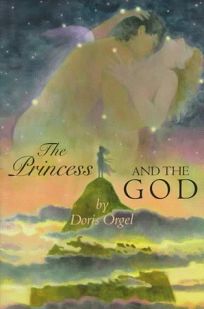Title of the work
Country of the First Edition
Country/countries of popularity
Original Language
First Edition Date
First Edition Details
Doris Orgel, The Princess and the God. New York, NY: Orchard Books, 1996, 116 pp.
ISBN
Genre
Mythological fiction
Novels
Romance fiction
Target Audience
Young adults (Young adults, 11 years and up )
Cover

Courtesy of Penguin Random House LLC.
Author of the Entry:
Ayelet Peer, Bar-Ilan University, ayelet.peer@gmail.com
Peer-reviewer of the Entry:
Lisa Maurice, Bar-Ilan University, lisa.maurice@biu.ac.il
Susan Deacy, University of Roehampton, s.deacy@roehampton.ac.uk

Doris Orgel
, b. 1929
(Author)
Doris Orgel was born in Vienna, Austria to a Jewish father. Her family escaped Vienna in 1938 and went to America where she attended school and college. She is a full-time children’s author and also translated children books from German to English. She currently lives in New York City. In 1998, her book, The Devil in Vienna received a Phoenix award.
Sources:
Bio at the univie.ac.at (accessed: October 4, 2017).
Profile at the penguinrandomhouse.com (accessed: December 29, 2016).
Profile at the muse.jhu.edu (accessed: December 29, 2016).
Profile at the c-span.org (accessed: December 29, 2016).
Profile on Goodreads (accessed: December 29, 2016).
Bio prepared by Ayelet Peer, Bar-Ilan University, ayelet.peer@gmail.com
Summary
The novel unfolds the love story of Psyche and Cupid. The story is mainly narrated from Psyche’s point of view, with her being the main narrator. However, we also read about the actions of Cupid and the other gods from the all-knowing narrator (parts that Psyche did not know about and therefore could not narrate in her own voice). This is a retelling of Apuleius’ tale from his Metamorphoses (The Golden Ass).
Analysis
The novel highlights Psyche’s perspective on the story and portrays the challenges she had to overcome. She is not a passive character but a true active heroine who errs and then learns from her mistakes and fights to correct them. The story, albeit the ancient setting, is modern in its perception of gender. In the original tale by Apuleius, Psyche was quite passive most of the time, we certainly did not hear her voice and her side of the story. Yet in the modern retelling Psyche takes center stage and is being portrayed as a round character, with thoughts and decisions of her own. The story conveys her feelings since her youth and her misgivings, her loneliness and her yearning for some kind of happiness and love. Narrating the events from Psyche’s point of view, rather than in the manner of an omnipresent narrator, creates closeness between the reader and the mythical heroine. A bond is created and the reader identifies with Psyche who undergoes regret and suffering before finally achieving the happy ending she deserves. This technique involves the reader in the mythological tale and makes the events seem closer and believable.
Furthermore, Psyche is a young woman who finds the strength in herself to fight her surrounding and the gods. She was always lonely as a child and her relationship with Amor gives her the happiness she always wished for. This gives the story an element of empowerment for young female readers, but also provides a universal message of hope for all readers, showing that situations can improve and that even if someone was lonely as a child, friendship and happiness can still be found later in life. Psyche is not presented as a larger-than-life character, but as a regular human being (apart from her extraordinary beauty) and therefore it is easier for the readers to identify with her. She does not overcome her hardships by using super human powers of any sorts, but rather by using her brains and by showing her good and kind nature (in contrast with goddess Venus who is harsh and even cruel).
Further Reading
Online review at publishersweekly.com (accessed: July 27, 2018).
Online review at kirkusreviews.com (accessed: July 27, 2018).
Online review at buffalolib.org (accessed: July 27, 2018).
Maurice, Lisa, "Cupid and Psyche for Children", in Regine May and Stephen J. Harrison, eds., Cupid and Psyche: The Reception of Apuleius’ Love Story since 1600, Berlin, Boston: De Gruyter, 2020, 381–396.


